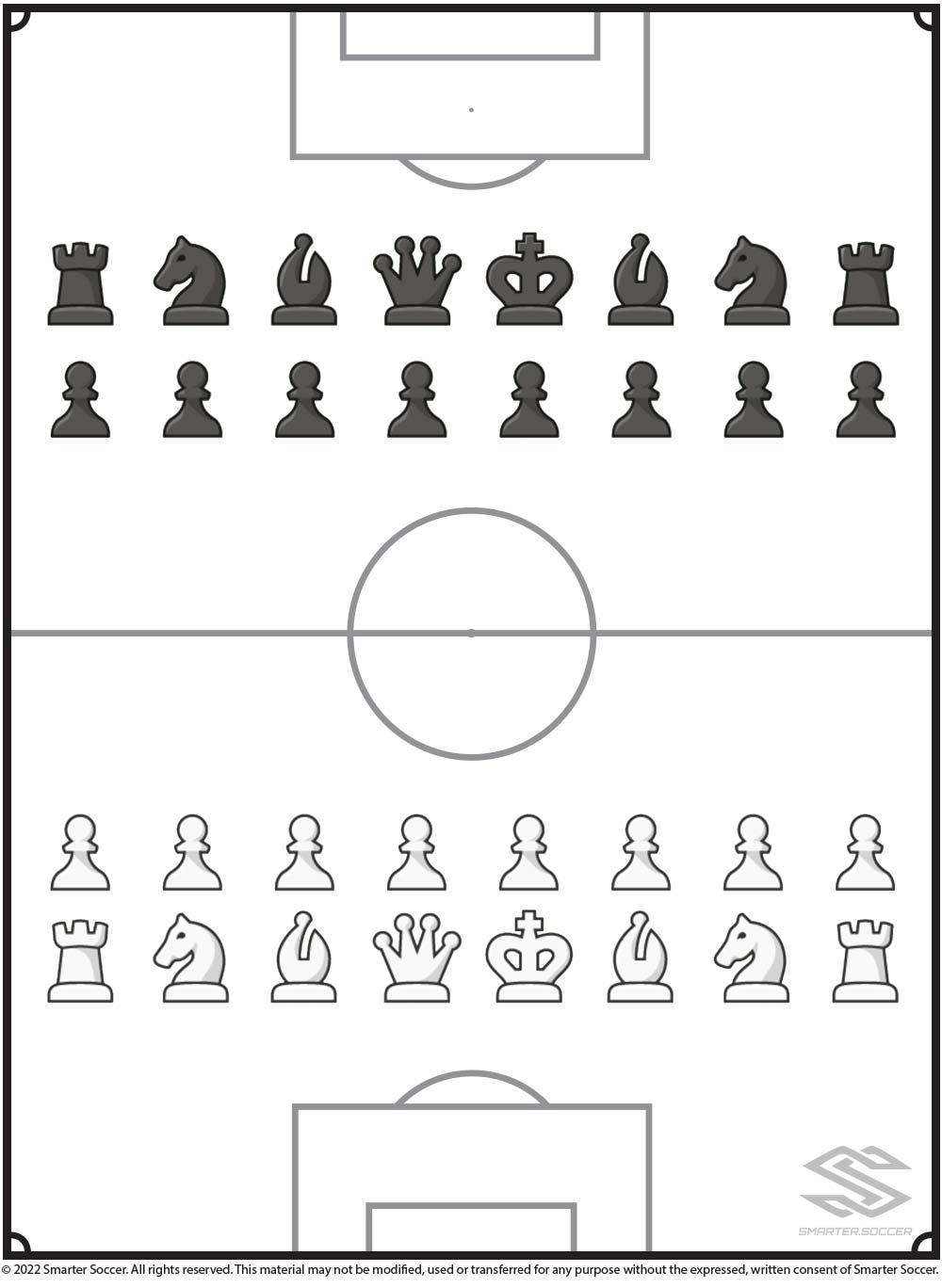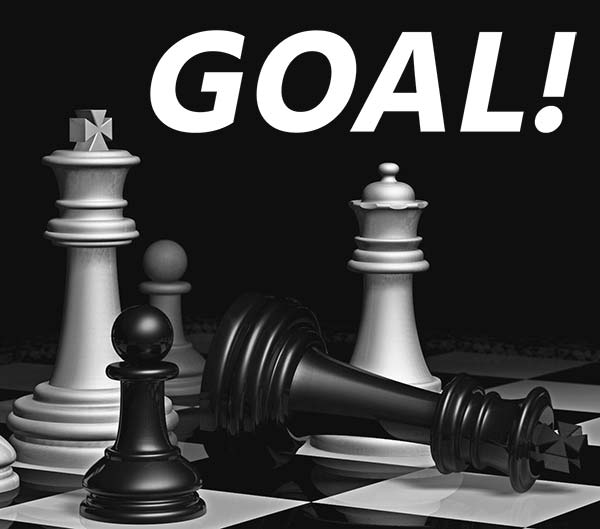SOCCER IS CHESS IN MOTION
One way to enhance your soccer intelligence is to look at soccer as a chess game in motion. Chess is thought to have originated in India about 600AD, where it spread to Asia, the Middle East and eventually to Europe. It is one of the oldest and now one of the most popular board games, thanks to the Internet where games can be played online globally. It is played on a square board, divided equally into squares of two different colors. Two colors of sixteen pieces, usually black and white, face off against each other. The checkered board is an analogy for a battlefield where two medieval armies clash. Each piece has defined rules on how it can move on the board. The lighter color moves first and the players alternate moves until one of the King’s is forced into Checkmate, a position where it’s unable to avoid capture. So how is this like soccer?
In many ways, soccer is like a chess game in motion. Two opponents face off, each with players in defined positions that have specific roles, and try to maneuver over the playing field to capture the king, or in the case of soccer to put the ball into the opponents goal. In chess, when one player attacks on their turn and puts their opponent’s Knight in jeopardy, the other player must defend so their Knight doesn’t get captured. Same in soccer, when one team is attacking, the other team must defend. That’s a very basic example, but there are more similarities as both games get more complicated.

The black “team” may attack the opponent on one side of the chess board in order to cause a distraction. The white team may not recognize this tactic and over commit their defense to that side. This now enables the black team to launch an attack on another part of the board now that the stronger pieces have vacated that area. Sound familiar? By causing the opponents’ Centerback to leave their area to pressure the ball while on the attack, it opens up space in front of goal where a stealthy midfielder can suddenly appear for a clean shot.
Just like chess, soccer is comprised of move, counter move — attack, defend — bait, trap — offer, deceive — maneuver, adjustment, and so on. However, unlike chess, you don’t have all the time in the world to contemplate your next move. This is why you have to be hyper aware of what’s happening on the field at all times. When you’re close to the action, sometimes the best you can do is simply being aware of your teammates and the opponents. However, when you’re away from the ball you can ask yourself: “What if?”
➤ What if?
What if? It’s a brilliant way to keep you connected to the game as a whole, and not just focused on the ball. Just like in chess, if you continually ask yourself “What if?” — you’ll be better prepared to react to the constantly changing dynamics on the field.
The first stage of “What if?” will focus on you and the part of the field near you. What if, the ball comes to me? — What if the ball comes to one of my teammates near me? — What if the ball comes to the opponent near me? By answering to those What if? questions, you’ll be far better prepared if the ball does come to you. But remember, soccer is a chess game in motion. Therefore, you can’t just ask and answer those questions once, you have to do it continually since the players and the ball are always changing on the field. I know. It’s not easy. But like anything, if you start practicing, you’ll get better and better at it as you develop as a soccer player. In fact, once you start reading the game and answering What if? questions for yourself, you can start asking them for your teammates, which will improve your communication.
For example, if you’re playing Left Back, and you see one of the opponent’s Center Midfielders repositioning themselves into an attacking position, you may want to alert your Midfielders to their advancement by yelling: “Who’s picking up number eight?!” You may actually do this already. If you do, you may not have realized that you’re reading the game and asking What if? questions. Now that you do, you can start doing it more consciously, and even better, more consistently.
➤ No Surprises
Hopefully after reading Chess Game In Motion, you’ll look at your gameplay in a new light. Instead of reacting to what’s happening on the field, you’ll start accurately anticipating what’s going to happen and be much better suited to make an impact on the game. Your personal objective is for there to never be any surprises. “I didn’t see him overlapping – I wasn’t aware she was behind me – I wasn’t ready.” These types of comments are not what you want to hear yourself say during a game.
Just like in chess, when you’re continually evaluating all the options, both yours and your opponents, you must be aware of all the possibilities on the field. Continual focus, awareness, situational awareness and communication all allow you to stay connected and anticipate what’s going to happen, before it happens.

In many ways, soccer is like a chess game in motion. Two opponents face off, each with players in defined positions that have specific roles, and try to maneuver over the playing field to capture the king, or in the case of soccer… to put the ball into the opponents goal.

NX.01
Communication
Answering “What If?” Questions For Your Teammates
Do you want to elevate your on-field communication? Communicate detailed information early and often. As stated earlier, once you move beyond what’s happening on the field around you, start expanding your “What If’s?” to your teammates.
Let’s get this straight, any sort of communication you’re providing to your teammate gives them an advantage. However, if you can anticipate what’s going to happen, before it happens, then you’ll be able to provide more detailed data, earlier. This is the difference between saying “Man On!” two seconds before a defender pounces on your teammate and “pressure coming from behind, pass it square to Emily!” In the first instance, you’re telling your teammate to hurry up and make a decision. In the second case, you’re telling her she’s about to have a problem and providing a solution. But offering a solution can only happen if you’re constantly asking yourself, “what if Margret gets the ball and doesn’t see the defender behind her? Well, she has Emily open to the side.”
★ Smarter.Soccer Insight: Provide your teammates with solutions to their problems. It certainly is beneficial to tell your teammate that they’re about to have a problem. However, it’s even more beneficial to provide them a solution to that problem. It’s this type of game intelligence that can give your team a crucial edge.

Trackbacks/Pingbacks